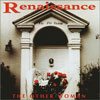RENAISSANCE : THE OTHER WOMAN
- Deja Vu
- Love Lies, Love Dies
- Don't Talk
- The Other Woman
- Lock in on Love
- Northern Lights
- So Blasť
- Quicksilver
- May You Be Blessed
- Somewhere West of Here
Label : HTD
Release Year : 1994
Length : 45:42
Review ( AllMusic) : The other woman in question here is Stephanie Adlington, who joins original guitarist/songwriter Michael Dunford in a bizarre period of "dueling Renaissances." While Renaissance's most famous vocalist was off creating Annie Haslam's Renaissance, Dunford opted to move forward with another gifted female vocalist and continue along the direction he felt the prog rock-cum-new wave band should be moving. How much of a duel were Dunford and Haslam's projects? Enough so that they even shared a song - the beautifully haunting "Love Lies, Love Dies" (which also shows up on Haslam's Renaissance's Blessing in Disguise in a much more refined form). Even the memorial on the cover seems to suggest an end to Dunford and Haslam's musical marriage. And while Adlington is indeed a fine vocalist, The Other Woman showcases just how strong a part of Renaissance Haslam truly was. Even though this is a fine collection of new songs by Dunford and Betty Newsinger (nee Thatcher), they lack that extra oomph that Haslam always had up her sleeve with her multi-octave range. It's certainly a pleasant album. But when put it side by side with Blessing in Disguise, it unfortunately pales by comparison. Dunford would try one more time with Adlington, remaking Renaissance hits (the forgettable Ocean Gypsy album), but it would take until the turn of the century for Renaissance proper to reunite and Haslam to take the place of "the other woman" and return to her rightful spot as Renaissance's one true vocalist. For the hardcore collector.
Review (ProgArchives) : In familiarizing oneself with the turbulent history of Renaissance, one has to come to terms with a complete changeover in personnel over a 2 year period in the early 1970s, a lyricist who never sang or played an instrument tenuously linking the two lineups, a return of the original incarnation under a new name, a few offshoots with similar names and, here, in the mid 1990s, two simultaneous dueling Renaissance's, one basically an Annie Haslam solo project, and the other, Michael Dunford's Renaissance, in which a young talented American named Stephanie Adlington tackles lead vocals. To her credit, she does not sound like a deer in the headlights, whatever that is, but instead boldly tackles a set that resides somewhere between the Haslam led "Time Line" and the more rocking aspects of a band that found a lot of favor with prog fans in the lean early 1990s, "The October project". Apart from its surprisingly uptempo nature, the album benefits from lyrics of long time Renaissance unofficial poet-laureat Betty Thatcher, who seems to have contributed content that suits Adlington's emotional range. However, this may have been a fortuitous accident, as apparently the writer had been through a bad breakup which may have more to do with the themes of deceit in love prevalent throughout, and the double entendre of the title itself. Right off, the key to enjoyment of "The Other Woman" is to forget whom she is replacing, and, even better, forget the name of the band. Within those confines, this is actually a competent pop rock album with occasional progressive touches. Apart from Adlington's throaty croon, the lead guitar solos of Stuart Bradbury on the catchy opener "Deja Vu" and the even more infectious "Don't Talk" banish the banal. Both "Love Lies, Love Dies" and the title cut are more dramatic ballads that could be signature pieces in a musical, and the latter offers up a haunting keyboard accompaniment. One doesn't hear a lot of Dunford on "The Other Woman", as he relegates himself to acoustic guitar, often absent other than in the decent version of the brilliant "Northern Lights", as well as composing and arranging. Only one track really emanates in any fashion from the mother ship, that being the closer "Somewhere West of Here", which would fit well on almost any 1970s Renaissance disk, perhaps even more so under Jane Relf's tutelage. That Andy Spillar's powerful keyboard arrangements do not drown out Adlington is testament to her power. It's full of tempo shifts and flourishes that recall chestnuts like "Candles are Burning" or "Day of the Dreamer". The coda subtly revisits the "Love Lies" theme as it gracefully exits. I may not make many friends with this comment, but I much prefer "The Other Woman" to the Dunford-Haslam reunion that bore fruit in 2001 in the form of the "Tuscany" album. It doesn't sound as much like Renaissance, but that allows one to assess it on its own merits rather than as a dim flicker of a once shining beacon. Since when does musical fidelity have to be monogamous?
